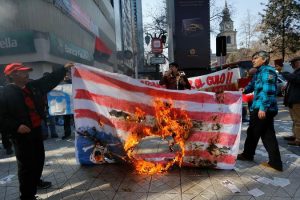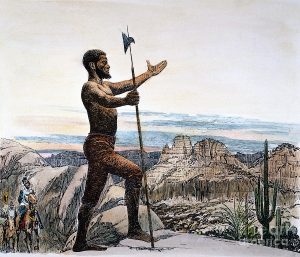In the New York Times article In Latin America, Pence Aims to Soften ‘America First’ Message, the author, Ernesto Londono, outlines a recent trip by Vice President Mike Pence to several countries in Latin America. The purpose of his visit being to President Trumps “America first” message, however little action is actually being taken. The US plans to create deals to open imports of avocados from Columbia, and exports of rice to Columbia, with the author regarding Pence’s actions as doing “ little in the way of concrete measures to announce,” (Londono). Many Latin Americans are hesitant to believe that the Trump administration truly intends to work towards a greater compromise for the US and its allies. Instead, many have stated that they are fearful of the common theme of the US being a bully. The severity is of this current crisis is apparent when a Member of the US Congress notes that, “unsure of what the White House’s intentions are and fear either a return to the days of U.S. arrogance and bullying or, at best, benign neglect,” (Member of US congress).
Furthermore, this statement comes from Mexican media outlets, giving the weight of the Member of Congress’s statement further magnitude. Camila Capriglioni, 21, a medical student in Buenos Aires proclaims that,.“if I put myself in the shoes of an American citizen, I understand the appeal of trying to prioritize your national interests.” The US has no reason to act so hostile towards Latin American countries; his intents are extreme.

The strong-willed Latin American community coming forth and visualizing their opinions to the Vice President of the United States, personifies nothing less than the bully that Donald Trump has become in concordance with Latin America. The class theme of Identity can be seen here with the Latin American decisiveness portrayed by general population that inhabits Latin america.
Link to video: https://nyti.ms/2vBDvsb



 Not only the Natives treated them like “son of the god”, the four “medicine men” also rewarded the Indian people and gained benefits mutually. According to Reséndez, once those four noble men received the presents from one tribe, they would give the rest to their followers.(193) The essence of the argument is that those four castaways are also grateful for the efforts those Indians spared and the kindness that Indians presented to the four. In addition, as the writer puts it, “other christians has already reached these remote lands and were casing so much harm to the natives”. Basically, Reséndez is implying that those four castaways developed the friendship with the natives and decided to help those Indians when they heard the Indians are brutally killed by the European conquistadors. This is a sign of the rationality overcoming the sensibility. It is true that the four castaways were indeed up in the air, however, instead of galloping to the Conquistadors, they took the Indians interest before the their sense of belonging to the Europeans. Additionally, from my perspective of view, the impulse of helping the Indians is due to their belief in God. The God’s will is rooted inside every angle of their life. Everything is under the supervision of the God. The four deserted people knew that it is a God’s will to testify if they could stand the test. It is their decision to choose whether they should lounge to the side of the Europeans or staying and helping by the Indian side. At last, they chose the later one.
Not only the Natives treated them like “son of the god”, the four “medicine men” also rewarded the Indian people and gained benefits mutually. According to Reséndez, once those four noble men received the presents from one tribe, they would give the rest to their followers.(193) The essence of the argument is that those four castaways are also grateful for the efforts those Indians spared and the kindness that Indians presented to the four. In addition, as the writer puts it, “other christians has already reached these remote lands and were casing so much harm to the natives”. Basically, Reséndez is implying that those four castaways developed the friendship with the natives and decided to help those Indians when they heard the Indians are brutally killed by the European conquistadors. This is a sign of the rationality overcoming the sensibility. It is true that the four castaways were indeed up in the air, however, instead of galloping to the Conquistadors, they took the Indians interest before the their sense of belonging to the Europeans. Additionally, from my perspective of view, the impulse of helping the Indians is due to their belief in God. The God’s will is rooted inside every angle of their life. Everything is under the supervision of the God. The four deserted people knew that it is a God’s will to testify if they could stand the test. It is their decision to choose whether they should lounge to the side of the Europeans or staying and helping by the Indian side. At last, they chose the later one.